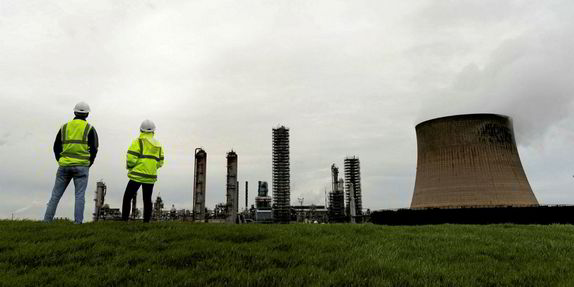
Billion dollar oil & gas fund backs supermajor-led zero-carbon UK cluster

BP, Eni, Equinor, Shell and Total take over project to capture and store industrial emissions from Teesside under North Sea.
A consortium made up of oil & gas supermajors BP, Eni, Equinor, Shell and Total has taken over a carbon capture and storage (CCS) project designed to decarbonise an industrial cluster in Northeast England by building a system to collect CO2, compress it and inject it in a reservoir under the North Sea.
The group, part of $1bn-plus Oil & Gas Climate Initiative (OGCI) investment fund, aims to accelerate development of Net Zero Teesside, previously known as the Clean Gas Project, said to be the UK’s “first zero-carbon cluster”.
Pratima Rangarajan, CEO of OGCI Climate Investments said:
“Net Zero Teesside is a demonstration of OGCI’s commitment to accelerating CCUS on a global scale,”
“It’s the anchor project, first ideated at the UK Energy Technologies Institute, developed into an industrial carbon cluster within OGCI Climate Investments and now, the first hub within OGCI’s CCUS Kickstarter initiative.”
Andy Lane, managing director of Net Zero Teesside, stated:
“Its advantageous location, advanced planning stage, the expertise of our world class project partners and government support for decarbonisation in the UK mean Net Zero Teesside is uniquely positioned to become the UK’s first decarbonised cluster.”
The formation of such a powerful partnership led by BP demonstrates the industry’s commitment to the UK government’s net zero targets.”
The consortium sees an “achievable potential start-up date of the mid-2020s … with the right government support“.
A combined cycle gas turbine (CCGT) facility with carbon capture technology will supply low carbon electricity “as a complement” to renewable energy sources to power the industrial cluster in Teesside.
Ben Houchen, Tees Valley Mayor, said:
“Net Zero Teesside [will] drive almost half a billion pounds ($650,000) into the regional economy and boosting the wider UK by £3.2billion … [and] safeguard and create 5,500 jobs for local people. It will act as a beacon for new technologies and further investment as other companies are attracted to our area, while helping the UK achieve its clean energy potential.”
Advancement of CCS technology has been slow-rolling over the last decade but projects, including the Northern Lights pilot, a scheme to develop a Europe-wide network of ships and pipelines to transport and lock away vast volumes of liquefied CO2 beneath the North Sea floor, have recently made milestone progress.
By NEPIC
754 Views
Recent Posts
- Protective coatings offer a robust solution for safeguarding your assets.
- Introducing the Tab-Ex® 05: Future-Ready Mobility for Industry
- NEPIC spoke with px Group to discover more about the organisation supporting women in industry and apprenticeships on Teesside
- Enhancing caustic soda production with clamp-on ultrasonic flow measurement
- Unlocking faster cancer treatments: The power of Project Orbis
Back to News >



